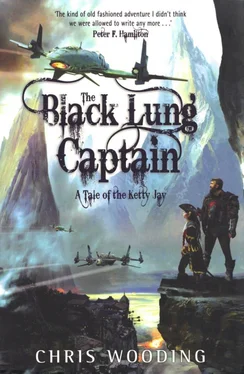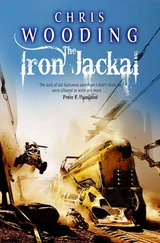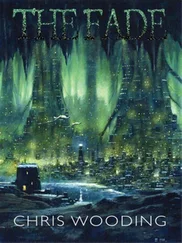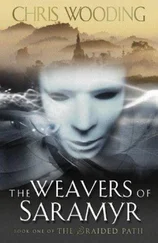This craft was empty, but it still resounded with the feel of them. She was searching for something, but she didn't know what.
I'm part of them. They're part of me. But I don't understand them at all. I don't know what they are.
She found a set of stairs and climbed them. Light grew as she neared the top, and she stepped into a long room. Six huge auto-cannons lay dormant before her, ranged along the port side of the hull. Grey daylight crept in through the open gunnery hatches in the dreadnought's flanks.
She approached the nearest autocannon. There was a seat for the operator mounted on the side, and a rusted control panel. She ran her hand over the seat, her fingertips scoring trails in the dust.
How do they live, these creatures? Do they argue, hope, love? What do they think? Do they think at all?
She pulled her hand away. Risky to even consider questions like that. The temptation was too great. She remembered the feeling of connection, of kinship, that she'd experienced when she was on the verge of turning. In that moment, she'd known how lonely and isolated she really was. How lonely all humans were. The Manes were linked, each one to every other. To be included in that was intoxicating.
It had been only the briefest of instants, but she'd never forgotten it. A moment of sight for a blind woman, before being thrown back into the dark. How could she not want more? And yet, what would be the price to get it? If she became a Mane, she wouldn't be human. If she was one of a collective, she wouldn't be an individual. She refused to be assimilated by anyone.
I am human , she thought, addressing the empty craft. Damn you for trying to make me otherwise.
She moved on, through the cannon bay. Beyond, she found a ladder leading to an upper deck, and climbed it. At the top was another slanted passageway, as chill and black as the others. Several doorways led off from it.
Protruding from one of them was an arm.
Jez stared at it. A forearm, visible up to the elbow, lay on the floor of the corridor. A torn, ragged sleeve. Yellowish, waxy skin. Long, cracked nails.
She went closer. The arm was attached to a body. The body lay in a room. And in that room . . .
There were dozens of them in there.
The room beyond the doorway had a large brass globe in the centre, showing the land masses of Atalon in obsidian relief. Beyond it was a porthole, overgrown with vines, but not enough to completely choke the daylight. There were charts on one wall, a desk, a bookcase. The books had been thrown from the shelves in the crash. Now they were scattered on top of the pile of Mane corpses that were heaped against one wall.
It was the captain's quarters. And there, among the pile, in a tatty greatcoat and boots, was the captain. Dead like the rest of them.
How can the dead die twice?
They'd lain here for decades. She knew that by the rainforest that grew around them. Yet they were perfectly preserved, as if they might get up and walk at any moment. The rot that infested the dreadnought hadn't touched them.
She stepped over the corpse in the doorway. It was similar to the one that had tried to turn her: human in appearance, but twisted. Yellow-red eyes stared, unfocused, from a wizened face. Sharp teeth were exposed in a snarl.
Some of the others were more hideous, others less so. Some had the look of monsters; some could have been human. One, even, was handsome, with a cold, eerie serenity to his face. Some wore rags; some were clad in motley armour. Some wouldn't have looked out of place on a street in Lapin; others wore fashions from times long past. There was not a mark of violence on them, except for the way they were heaped up on top of each other. As if they'd been thrown against a wall, limp and inanimate as the books that followed them.
The smell, that awful, comforting odour, was strong here. Dry and animal-like. The smell of the Manes.
She looked away from them. They were painful to see. Something about them inspired a sad ache in her chest.
They didn't even seem dead, not really. They'd just . . . stopped.
Her eyes fell on the books, scattered about the room, lying open, their pages bent. Some of them were in Vardic. Classics, many of which she'd read. Several were in Samarlan and Thacian, languages she recognised but couldn't speak. But most were in a script she'd never seen before.
She picked up the nearest and studied it. The text was elegant and complex, all in curves. Circles and semicircles, speared through by arcs. Not a straight line to be seen.
Where did this come from? she thought. It was printed, professionally done. She frowned at it, trying to puzzle out where it might have originated. Peleshar? Well, maybe. It was possible.
But maybe the Manes had printing presses. Maybe they made books.
Maybe they had their own literature.
The thought dizzied her. Jez had seen them come from the sky to murder or kidnap the entire population of a small Yortish town. Feral creatures, springing from the rooftops, flickering and flitting like stuttering flames, sometimes moving too fast for the eye to follow. They'd mobbed men like animals, torn them apart with inhuman brutality.
But these same creatures built and flew aircraft. They stole buildings, and presumably rebuilt them. And now, it seemed, they wrote stories.
She let the book drop from her fingers. Nothing made sense. She'd been inducted into a club without knowing anything about its members or what it stood for. The idea of the Manes as a civilisation didn't match with their thoroughly deserved reputation as vicious, merciless raiders. No one, to her knowledge, had ever heard them speak. So what were they? Animals? Humans? Or something else?
For that matter, what was she?
She squatted down next to the pile of corpses. The captain was bearded, his face half-covered by a hat, eyes fierce and red, teeth sharp. Driven by some compulsion she didn't understand, she reached out toward his hand.
Just to prove I'm not afraid. Just to prove they'll never have me. Just to know if I can.
Her hand closed around the captain's, and the images burst into her mind as if through a dam, a deluge of screams and pleading, sweeping her away.
—a captain, a rebel, a man made Mane who didn't want to be— —no more raids, no more murder, no more taking of people. No more Invitations. No more—
—they are turning away from their brethren, severing connections, a crew setting out for a new world, a new life, isolation, peace—
—but then came the loss, the lack! Once part of many, now they are few, too few—
—Once they were beloved, but they turned away. The horror of their mistake overwhelms them but it cannot be undone and still they go on—
—into the loneliness, the endless, all-swallowing loneliness—
—too much to bear—
—too much—
She washed up on the shores of reality to find herself back in the captain's quarters, freezing cold. She scrambled away from the corpses, tears gathering. The captain's dead eyes stared past her. She knew now what was behind that gaze. She'd been brushed by the tragedy, the inexpressible sorrow of this crew. They'd been Manes, and chose not to be. They cut themselves free. The loss of it killed them.
They lay down and died here, together, she thought. They died of loneliness.
She heard a footstep in the doorway, and looked up. Silo was there, lantern in hand. A flicker of concern passed across his face as he saw her.
'Cap'n sent me lookin',' he said.
She flung herself at him suddenly, hugged herself tight to his chest. All that she felt, all the fear and horror and sadness . . . she couldn't keep it in any more.
Читать дальше












